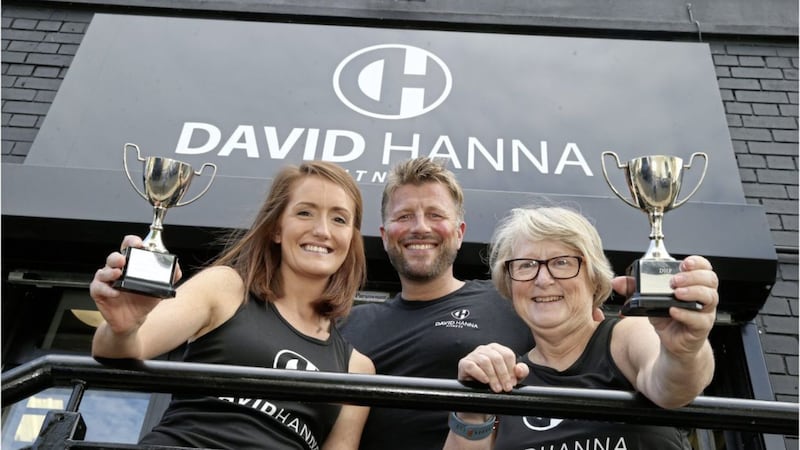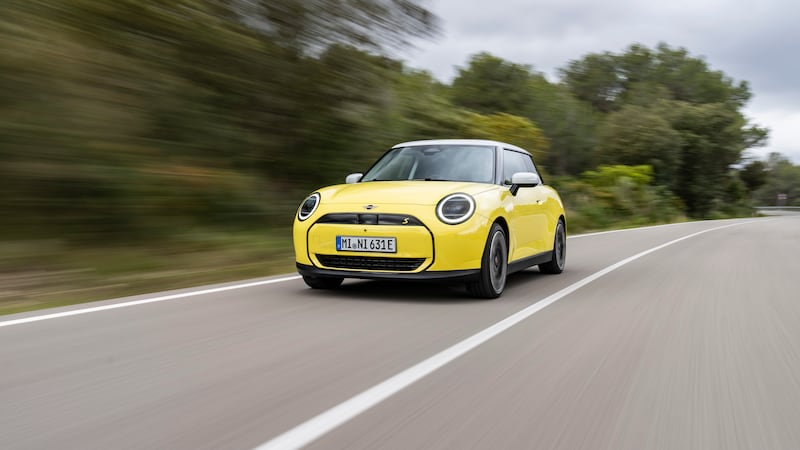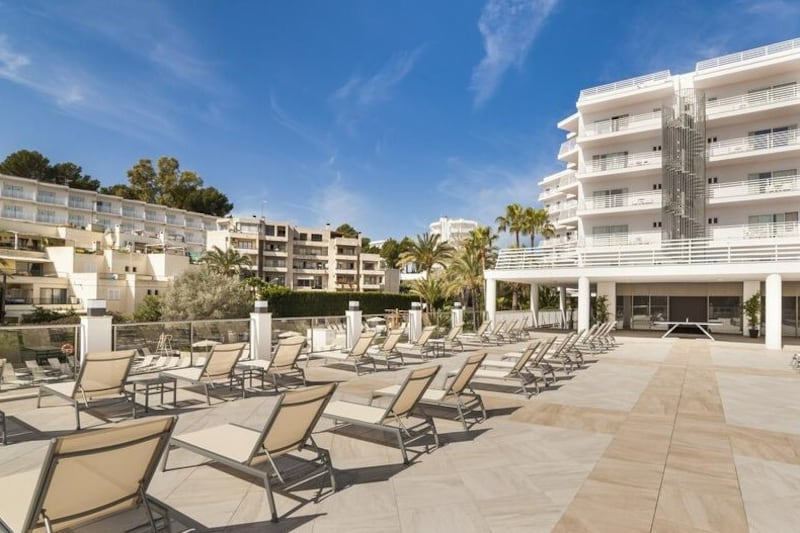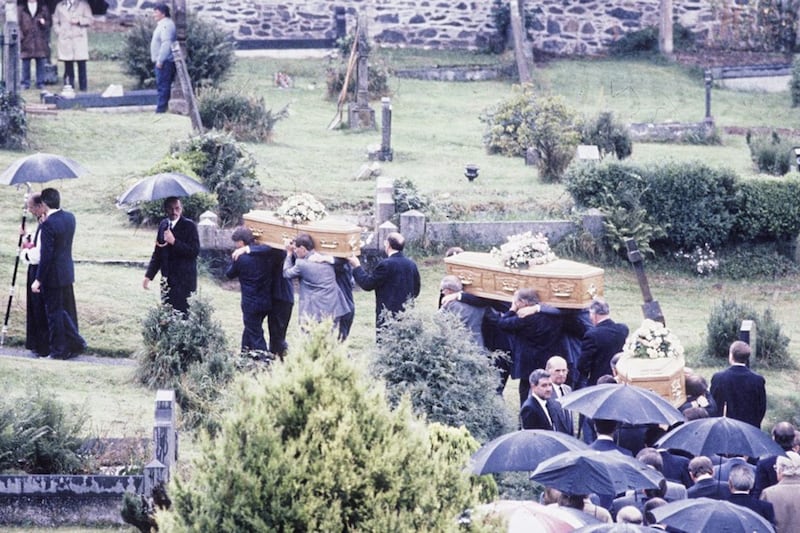A FORMER shotput champion and boxer, David Hanna was always a 'big lad' at school. As part of his training regime, he took up running – first cross-country with the Lagan Valley Athletics Club, then later, as a javelin champ, sprinting.
Not only did the weight fall off, he developed a lifelong passion for running – a passion which is now benefitting others.
When David began working as a personal trainer, he decided to set up a running club – long before Parkruns and Couch to 5Ks were as prolific as they are now.
In those early days, when David organised trips away to European cities to compete in half marathons, only a handful of clients went along. These days, around 40 members of his running club join him.
David now has his own gym in south Belfast, David Hanna Fitness, and has trained celebrity chef Michael Deane and BBC television presenter Jo Scott. He says running as part of a group has many advantages.
"Everyone who joins my running club has the same goal in mind – to improve their life in some way. I have members who joined to lose weight, to tone up or to improve their fitness levels.
"The great thing about running together is the shared energy and motivation. Then there's the social side too. Some strong friendships have been formed.
"It doesn't matter who are you, what your social background is or what job you have. The power suits are left behind, you're out of the office environment and everyone is standing there in tee-shirts and shorts, with a bottle of water in their hands. Running is a great equaliser."
While some people are natural runners due to their shape, stability or strength, others need to spend a few months training to improve their fitness levels.
"It's horses for courses really," he says.
"Some people take to running like a duck to water. Others might have issues with their knees or hip alignment or are carrying too much weight. We need to work on their core strength and stability before they start running but I can guarantee, once they start, they'll find it totally addictive."
Retired cancer surgeon Sigi Refsum was an 'intermittent' runner who incorporated the occasional Parkrun and 10K into her general fitness regime.
But when she was faced with her own cancer diagnosis in 2015, she set herself a huge challenge – to run her first half-marathon once her treatment was completed.
"Two and half weeks after my final chemotherapy session, I went back to the gym to rebuild my strength so I could return to work. I had no notion of ever running again; I hadn't thought much about it. Six months of chemo and radiotherapy had left me short of breath.
"However I do like a challenge and when one of the trainers in the gym I was attending at the time, David Hanna, told me about the half marathon in Dubrovnik, I asked some colleagues from the City Hospital if they fancied doing it with me.
"I'd done Parkruns before and a 10K in Barcelona but I'd never tackled a half marathon. I'd let my body heal during treatment, then afterwards, I'd got my fitness levels back up again and felt ready to take on the half marathon.
"For me, it was about testing my fitness and taking on a new challenge in good company and in a beautiful place."
For Sigi, who lives in south Belfast, running became a means to an end – to boost her fitness levels post treatment and to protect her future health.
"As a consultant surgeon in the cancer field, I was always aware that increased fitness levels and exercise improve the survival rate of breast cancer by 40 per cent," she says.
"I've always known about the benefits of exercise, which is way I trained in the gym several times a week."
Having retired from the City Hospital last year, Sigi began training for the Dubrovnik half marathon by taking part in Parkruns in Victoria Park and the Waterworks in Belfast.
Along with four breast cancer nurses from the City Hospital, and with David on hand to offer support, she completed the race in the Croatian city by taking it at her own pace.
"For me, running helped me get back to the level of fitness I had before my cancer diagnosis," Sigi says.
"Mentally, running helps as well. Doing that half marathon proved to myself that I could still do the things I'd done before the diagnosis and treatment. It was tough enough on the day but I'm so glad I did it. I really felt like I'd achieved something and that was a great feeling.
"I'm not sure I'll do another another half marathon but I certainly haven't ruled it out. Never say never. Running got me back to my old self and got me fit again."
Belfast mum-of-two Laura Golden took up running last August to help her get back into shape again following the birth of her second child. A relative novice to the sport, she'd run a few times before on her own, but joining David's running club really helped motivate her.
Earlier this year Laura, along with a group from her club, travelled to Vienna to take part in a half-marathon – her first time running just over 13 miles.
"I completed the half marathon in one hour, 48 minutes, which I guess isn't bad for my first one," she tells me.
"In fact, I won the Fastest Female title among our group, which I was thrilled about. I've since run a 10K in Newcastle and have signed up to so a half -marathon in Belfast this September. I've definitely been bitten by the running bug."
Laura says there are many reasons why running has become so popular and why it's her go-to form of exercise now.
"I find running relaxing," she says.
"It's a great way of staying in shape, enjoying the fresh air and nothing beats that feeling you get after a good run. The main reason I enjoy it so much though is the social side. It's nice to run with a group of people you can socialise with as well.
"When I first started running with the club, it was pretty nerve-wracking. But David kept supporting me and kept me motivated and the more I ran, the better I became.
"Now I can't imagine my life without running being part of it."
In recent years, David has noticed a huge spike in the number of people who are taking up running and says Parkruns, Couch to 5K running plans and marathon relay teams have played a significant role in this rise.
"Whoever invented Parkruns deserves a medal," David says.
"Now we see children dragging parents along and parents dragging children along and before you know it, the family are all running together and loving it.
"For some time there was a backlash against running, with doctors saying it was bad for you. That's not the case any more. It's been proven that running is easier on the knees than walking and it promotes better health for bones."
David also points out the positive impact running has in the fight against depression – something he appreciates only too well after suffering a dip in his own mental health while laid up in the wake of breaking his foot several years ago.
As well as putting on weight, the break from running had a detrimental effect on David's wellbeing too.
"That was definitely my lowest point," he says.
"For me running was a way of life, a release from tension and stress. It took me two years to fully recover and to shift that extra weight. I really missed running and it got me pretty down.
"Now, I appreciate it more than ever. There's nothing quite like that buzz of getting outdoors in the fresh air with a great bunch of people. Once you start running, you'll never look back."
:: FB.com/davidhannapersonaltrainer





